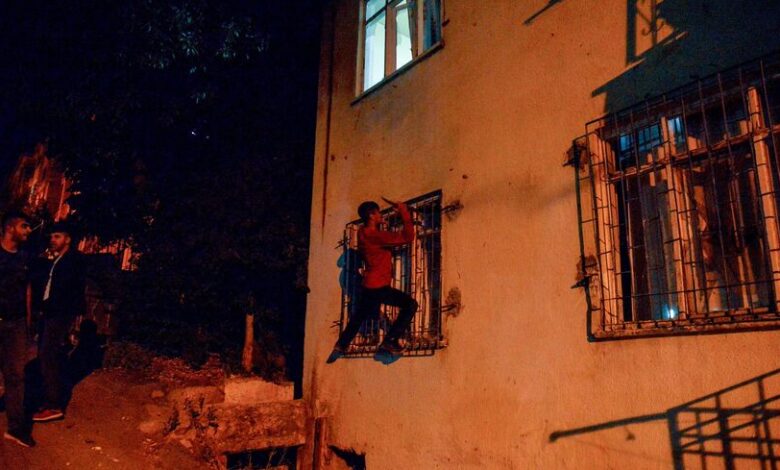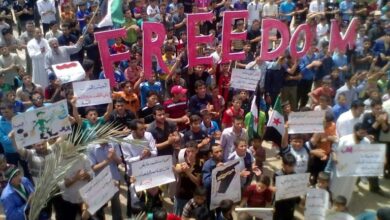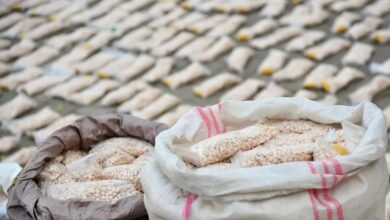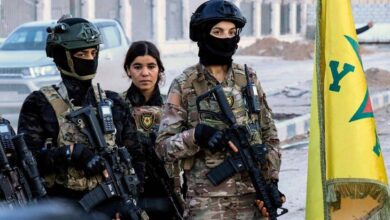Syrian refugees in Turkey are living in constant fear among rising attacks, while the Turkish government increases restrictions on them.
Fear is rising among Syrian refugees in Turkey amid growing hate speech and murder targeting them.

Istanbul alone witnessed within a month two separate killings of two young Syrians. The young men’s bodies were moved to Syria’s northwestern province of Idlib.
On June 14, social media activists circulated a video showing the killing of Sultan Abdul Baset Jabneh a day earlier in the Taksim district in Istanbul, after Jabneh was stabbed in front of his shop in Taksim.
On June 6, six young Turkish men killed Sherif Khaled al-Ahmad, a 22-year-old Syrian refugee, in the Bagcilar district in Istanbul. A few hours before he was shot and killed, Ahmad told his friends that he was going to propose to a woman he was dating. He also told them that he was bored with life in Bagcilar where he resided and was thinking of returning to northern Syria or even crossing into Europe, a far-fetched dream for many Syrian refugees.
In another attack against Syrian refugees in Turkey, 70-year-old Leila Muhammad was hit in the face and insulted in Gaziantep on May 30. The incident caused widespread anger on social media, with many Syrians in Turkey expressing their solidarity with the elderly woman. The incident also unleashed an outcry among Turkey’s civil society, with dozens of women’s rights and human rights groups condemning the incident.
A Syrian refugee from Douma in the Damascus countryside currently residing in Istanbul’s Fatih district spoke to Al-Monitor about the rising number of attacks against Syrians in Turkey. This person spoke under the pseudonym Ahmed al-Ghoutani for fear of being deported.
“Incidents against Syrians are being repeated everywhere in Turkey, especially in schools and the workplace. Hate speech and racism are currently at its highest levels, especially by political parties that incite against Syrian refugees,” he said.
Ghoutani said that he has not been spared racist incidents at his workplace at a coffee shop in Fatih.
A few days ago, he recounted, an elderly Turkish man stood in front of his shop and looked at him with contempt. When Ghoutani asked “How may I help you?” in Turkish, the Turkish man — seeing the words Ghoutani had written in Arabic — replied “You should be ashamed,” because Ghoutani had written in front of his coffee shop prices in his own language, which is Arabic, yet he lives in Turkey.
The Turkish man was annoyed and told Ghoutani that one day they (Syrians) will have to leave Turkey and their occupation of the country will be over.
“I got used to that. This is one of the many incidents I remember. But there are dozens of daily encounters I experience, although I try to be very nice with the Turks more than with the Arabs, and I offer them coffee just to show them the Damascene hospitality. Unfortunately, nothing seems to work with them. There is an indescribable hatred toward Syrians, and I wish I knew where it comes from,” he said.
“When I close my shop at night, I fear facing the same fate as the youths who were killed in Istanbul for racist reasons. The perpetrators are never held accountable. There is always a reason justifying what they did, including that [the perpetrator] is mentally ill or that it is a normal thing. This is really unacceptable from the Turkish government and the people here. There is too much hatred in the street,” he added.
“When I return home, I hear the news that [our] data, address [as Syrian refugees] must be updated because of problems in the system … that appointments [for certain procedures] were not booked or that my temporary protection card was suspended,” he said.
Ghoutani continued, “The temporary protection card of my wife and I was canceled because we live in an area [that is not covered by this card]. We are trying to rent a house in another area, but to no avail, just because we are Syrians. A few days ago, I contacted a person who had listed a house for rent at a high price. But the Turkish person said that we are Syrians and he does not rent to Syrians.”
He added, “I only care about renewing my temporary protection ID card, and my address needs to be verified for that; otherwise, my wife and I will be deported. I have small children. … The situation has become unbearable, and I hope the border with Europe will be open to be able to leave Turkey as soon as possible.”
Mulham Obeid, a 20-year-old engineering student at Gaziantep University who hails from the Aleppo countryside and currently resides in Gaziantep, told Al-Monitor, “A few days ago, on my way back from work in a fabric factory in the industrial area in Gaziantep, Turkish youths tried to kill me only because they asked for a cigarette and I told them I didn’t have any. They asked if I am Syrian. When I did not reply, they took knives out. I did not know what to do. I gave them all the money I had. It was so scary.”
When asked if he reported the incident at the police station, Obeid said, “Why? To be deported? Being a Syrian [in Turkey] has become a crime.”
He added, “I face almost daily racism by Turkish youth, not to mention that the employer pays me a wage according to his liking and refused to obtain a work permit for me. If the authorities know about that, I will be the culprit. But I did not find any other job.”
Incitement against Syrian refugees in Turkey has increased amid questions about the goal behind this incitement that threatens Turkey’s own stability and economy. Meanwhile, the Turkish government continues to make decisions and impose restrictions on Syrians that many observers describe as a way to pressure Syrian refugees inside Turkey.
Among those decisions, the government has restricted the Syrians’ right to temporary protection and residency while restricting their presence in some parts of the country. Such moves may fall within Turkey’s use of the Syrian refugee issue as a political card in the general elections scheduled for next year.
By Al-Monitor





